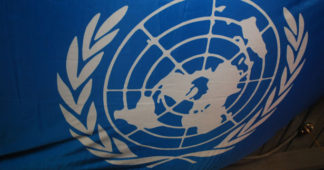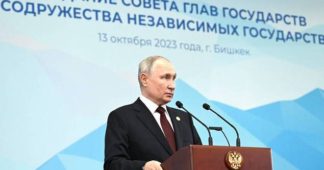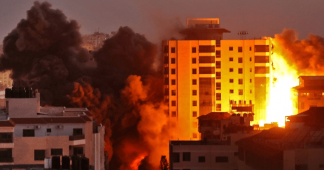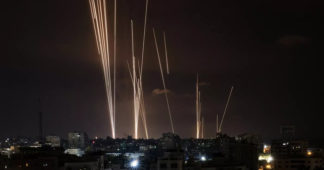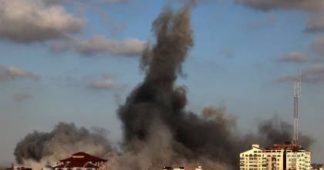By Ekaterina Blinova
Oct 14, 2023
The Gaza crisis serves as a reflection of the crumbling unipolar rules as the world is embracing multipolarity and seeking new approaches to simmering conflicts.
Neither Israeli nor American intelligence seemed to be aware about the preparations for Hamas’ surprise assault on Israel last Saturday.
“The Middle East region is quieter today than it has been in two decades,” US National Security Adviser Jake Sullivan claimed at the Atlantiс Festival on September 29, suggesting that Washington could now shift its focus on the Ukraine conflict and containing China’s rise in the Asia Pacific.
As it turned out later, the night before the Hamas attack the Israeli intelligence agencies spotted signs of irregular militant activity in Gaza but IDF and Shin Bet’s top brass decided not to put the Israeli military patrolling the border on high alert, according to the US press. Apparently, the Israeli security leadership also believed that the situation was largely under control.
The Hamas brutal rocket strike and sudden infiltration of Hamas militants in Israel’s territories where the group met little if any resistance became a wake-up call for both Washington and Tel Aviv.
However, the erupted conflict is the result of a string of mistakes made by the international community and the US, in particular, during its unipolar moment, according to Alexander Asafov, political scientist, member of the Russian Association of Political Consultants.
“It was [the US] who sowed the seeds of these mistakes, which have led to these smoldering conflicts,” Asafov told Sputnik. “And, of course, we see a clear manifestation. [The current crisis] in the Middle East, this is the result of just such a conflict. After all, it was [US President Donald] Trump who moved the US Embassy to Jerusalem. The Americans did a lot of things to prevent pacification in this area, not to mention the implementation of the 1947 UN Security Council decision on the creation of an Arab state in Palestine. Therefore, of course, this is a clear manifestation of the fact that there is no longer any Pax Americana, no unipolar world. And now the world is entering a new transition period, towards multipolarity, including through pain, blood and awakening conflicts.”
According to Asafov, the US and its Western allies did not seek ways to resolve the contradictions once and for all: they capitalized on festering wounds of local crises in the Middle East, Africa, Central Asia and elsewhere.
“The world’s hegemon [the US] has kept many conflicts smoldering through manipulation, forceful pressure and various other tools that they call ‘soft’ or ‘smart’ power,” the political scientist continued. “And [Washington] did this deliberately, because it helped both earn money and, among other things, ensure a certain influence and control through dormant conflicts.”
The bombing and fragmentation of Yugoslavia, the invasion of Iraq, Afghanistan, Libya and Syria by the US and its NATO allies led to rewriting maps, dragging countries into chaos and looting their national wealth. However, the US’ Iraqi war created a power vacuum leading to the emergence of Daesh (ISIS/ISIL)* and other Islamist groups, while the Washington-backed Afghanistan government collapsed in just hours after the Taliban** takeover of Kabul.
Likewise, the US administration’s manipulation of the Israeli-Palestinian issue led to unintended consequences in the Gaza Strip, which dealt a third blow to the Biden administration after the botched Afghanistan withdrawal and the failed Ukrainian counteroffensive.
“The Palestinian question is unresolved and, as recent events demonstrate, it is still smoldering,” noted Dr. Marco Marsili, associate fellow at the Centre for Strategic Research and Analysis, who holds research positions in major civil and military institutions in Portugal, the UK and Italy.
Earlier, Sputnik’s interlocutors warned that the US and UK’s naval deployments near the region could fan the flames of the crisis even further instead of calming it down since Iran and Lebanon’s Hezbollah might consider the Western military buildup as a provocation and a direct threat.
Per Asafov, old rules of show of force and intimidation don’t work, and international players need to tread carefully to avoid bigger conflicts. Thus, the irresponsible militarization of Ukraine, Taiwan and Israel will make the world less safe and more turbulent.
“The fact is that only this way they could show that their old rules, bloc rules – not civilizational ones based on values, but colonial rules based on financial gain, and pumping out resources from other countries – still work and can defend themselves. This could only be demonstrated in this way. This is what they do,” said the political scientist.
However, these colonial rules no longer work, per the academic, meaning that global and regional players would have to sit at the negotiating table as equals and find the solutions to the urgent crisis including the unfolding conflict in the Gaza strip.
*Daesh (ISIS/ISIL) is a terrorist organization banned in Russia and many other countries.
**The Taliban is an organization under UN sanctions for terrorist activities.
We remind our readers that publication of articles on our site does not mean that we agree with what is written. Our policy is to publish anything which we consider of interest, so as to assist our readers in forming their opinions. Sometimes we even publish articles with which we totally disagree, since we believe it is important for our readers to be informed on as wide a spectrum of views as possible.
